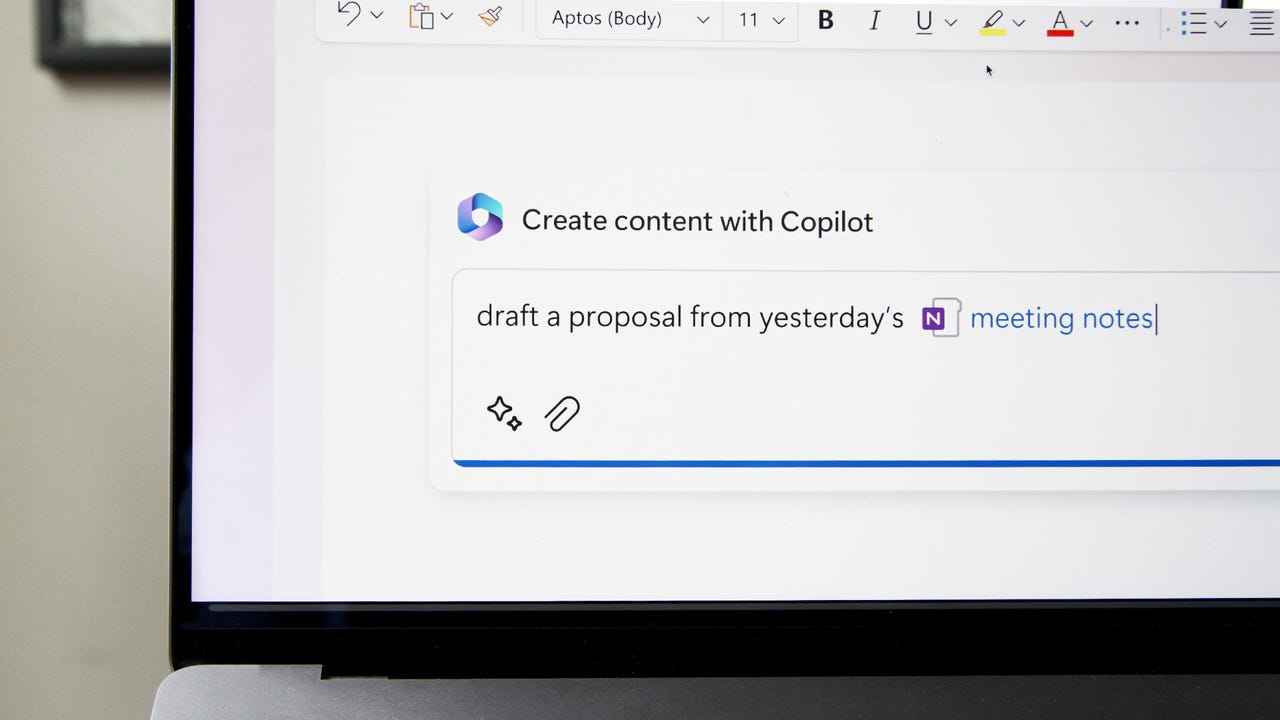Microsoft embraces OpenAI's ChatGPT plugin standard

Microsoft 365 Copilot in Word.
During the latest iteration of its annual Build developers conference, Microsoft made a series of announcements that aim to simplify the development of artificial intelligence apps and copilots, as well as the adoption of the same open plugin standard introduced by OpenAI for ChatGPT.
This move will make it easier for developers to create plugins and use the new Bing Chat's powerful structure, built with OpenAI's GPT-4. These plugins can have Bing help users easily order groceries, find a new house, or make restaurant reservations, all from within the Bing chat window.
Also: Microsoft just supercharged ChatGPT with Bing's AI-powered search
In turn, this will empower developers to create plugins that work seamlessly across both business and consumer interfaces.
"A plugin is about how you, the copilot developer, give your copilot or an AI system the ability to have capabilities that it's not manifesting right now and to connect it to data and connect it to systems that you're building," according to Kevin Scott, Microsoft's chief technology officer. "I think there's going to eventually be an incredibly rich ecosystem of plugins."
Also: Microsoft Edge gets AI-powered upgrades and these other new features
In addition to the previously announced OpenTable and Wolfram Alpha plugins, Bing is now incorporating plugins from Zillow, Klarna, Instacart, Kayak, Redfin, and more. This integration will give users access to these services directly from within Bing Chat.
Developers create plugins to act as bridges between information sources and programs, in this case, AI systems. They enable copilots to retrieve real-time data, incorporate proprietary business data, perform complex computations, and execute actions on behalf of users.
Also: OpenAI unveils ChatGPT plugins, but there's a catch
The adoption of the same plugin standard as ChatGPT will guarantee interoperability across ChatGPT and Microsoft's wide array of Copilot programs, including Dynamics 365 Copilot, Microsoft 365 Copilot, and Windows Copilot.
Microsoft also announced an expansion to its Copilot programs, with Copilot in Power BI and Copilot in Power Pages currently in preview stages. Copilot in Microsoft Fabric and Windows Copilot will also become available for preview soon.
Also: Bolstered Dev Box leads developer delights at Microsoft Build 2023
"You may look at Bing Chat and think this is some super magical complicated thing, but Microsoft is giving developers everything they need to get started to go build a copilot of their own," Scott said. "I think over the coming years, this will become an expectation for how all software works."
As Microsoft extends the plugin capabilities to Copilot, it offers developers the opportunity to leverage Teams message extensions and Power Platform connectors within Microsoft 365. This will empower them to strengthen existing investments and easily create new plugins using the Microsoft Teams Toolkit for Visual Studio Code and Visual Studio.
Developers will build most copilots in the world
These updates from Microsoft will give programmers the ability to develop, test, and deploy their own plugins, and customize the abilities of Microsoft Copilots to enhance their own generative AI applications.
A copilot trained on a large language model, for example, can have access to businesses' data and backend systems, giving it the power to respond to queries from employees based on specific company knowledge.
Also: Microsoft adding more AI smarts to Windows 11 via Copilot and Dev Home
Though the expansion of its Copilot stack continues, Scott claims that independent developers -- not the company -- will be the ones to create most of the available copilots in existence in the future.
"They will understand a particular thing that they or their users are trying to accomplish, and they will use this AI software development pattern to go build those things for those users," Scott said.
This will considerably accelerate the pace of innovation for Microsoft's customers, as Visual Studio Code, GitHub Copilot, and GitHub Codespaces simplify the plugin development process, offering tools for creation, debugging, and deployment.
Also: Microsoft announces Azure tools to help developers deploy complex environments and secure their apps
"The point where we are today is just fantastic. You can take a large language model like GPT-4 and start using that to build applications," Scott said. "We've established this new application platform called Copilot."
With the Azure AI Studio, developers will be able to run and test plugins on private enterprise data, to make for a smooth integration experience. Once complete, the plugins will work across Microsoft's Copilot experiences.
Also: The Microsoft Store will help curate AI tools for you now
The complete Microsoft ecosystem gives developers all the tools they need to build software that is fit for the current AI landscape. With seamless interoperability across various Microsoft offerings and the integration of OpenAI's tools, developers can create a diverse range of plugins for enhanced user experiences.
"We have everything you need on Azure for making a copilot," Scott added. "And those things work super well together, so trying your idea and iterating quickly will be easier to do on top of Azure than it will be any other way."
